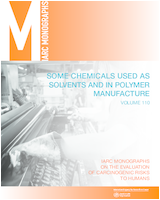NCBI Bookshelf. A service of the National Library of Medicine, National Institutes of Health.
IARC Working Group on the Evaluation of Carcinogenic Risks to Humans. Some Chemicals Used as Solvents and in Polymer Manufacture. Lyon (FR): International Agency for Research on Cancer; 2017. (IARC Monographs on the Evaluation of Carcinogenic Risks to Humans, No. 110.)
6.1. Cancer in humans
There is sufficient evidence in humans for the carcinogenicity of 1,2-dichloropropane. 1,2-Dichloropropane causes cancer of the biliary tract (confirmed as cholangiocarcinoma).
The major challenge in evaluating the occurrence of cancer in the Japanese printing plants was to determine whether the observed excess of cholangiocarcinoma could be attributed to a specific agent, measured or unmeasured. Workers were exposed to numerous chemicals, but 1,2-dichloropropane was known to be common to all except one of the 24 cases of cholangiocarcinoma. Moreover, 6 of the cases had no exposure to dichloromethane and the Working Group’s estimate of the relative risk for these cases was extremely high. Based on this evidence, the majority of the Working Group concluded that 1,2-dichloropropane is the causative agent responsible for the large excess of cholangiocarcinoma among the workers exposed to 1,2-dichloropropane, but not dichloromethane. However, a minority of the Working Group concluded that the association between 1,2-dichloropropane and cancer of the biliary tract was credible, but the role of exposure to other agents, principally dichloromethane, could not be separated with complete confidence, and noted that most of the evidence came from studies in a single plant.
6.2. Cancer in experimental animals
There is sufficient evidence in experimental animals for the carcinogenicity of 1,2-dichloropropane.
6.3. Overall evaluation
1,2-Dichloropropane is carcinogenic to humans (Group 1).
- Evaluation - Some Chemicals Used as Solvents and in Polymer ManufactureEvaluation - Some Chemicals Used as Solvents and in Polymer Manufacture
Your browsing activity is empty.
Activity recording is turned off.
See more...
